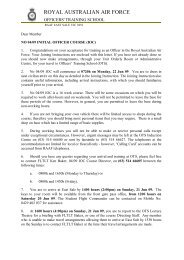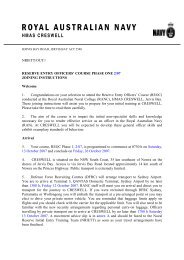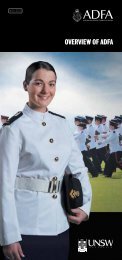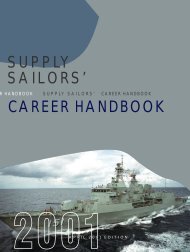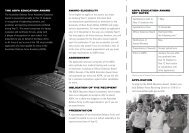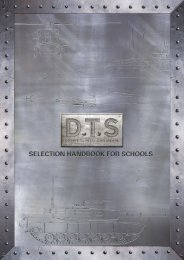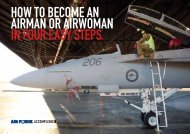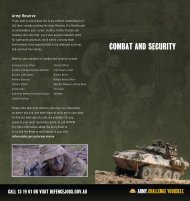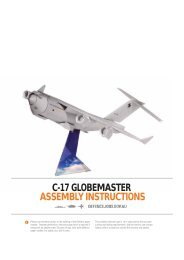Plumber - Australian Defence Force Recruiting
Plumber - Australian Defence Force Recruiting
Plumber - Australian Defence Force Recruiting
- No tags were found...
You also want an ePaper? Increase the reach of your titles
YUMPU automatically turns print PDFs into web optimized ePapers that Google loves.
GPY&R MDFA3520PLUMBERWhy does the Army need<strong>Plumber</strong>s?<strong>Plumber</strong>s play an important role in the Army providingwater, gas, stormwater and sewerage services in a widevariety of applications. Not only do <strong>Plumber</strong>s work in ‘base’environments, they’re also deployed to overseas countries intimes of need such as humanitarian disasters.What will you be doing?<strong>Plumber</strong>s serve in the Royal <strong>Australian</strong> Engineer Corpsin both Construction Squadrons and Combat EngineerRegiments. As a <strong>Plumber</strong>, you’ll be responsible forperforming advanced drainage, sanitary, water supply, roofplumbing and intermediate gas and mechanical services.You’ll also perform plumbing and general building tasksassociated with the construction, repair and maintenanceof a variety of structures in wide ranging environments.Some of your other responsibilities may include assistancewith site preparation, planning for building tasks andassisting in the maintenance of workplace health andsafety. You’ll also find yourself liaising with projectpersonnel on matters relating to plumbing and constructionrequirements, assisting in the compilation of specifications,scope of works and cost estimates and deploy to the field toprovide plumbing and construction support during exercisesand operations.hat makes the job worthwhile?You’ll be involved in important projects that have worldwideimpact such as deploying to East Timor on peacekeepingmissions, while working in a team environmentwith like-minded individuals. Currently there are <strong>Plumber</strong>sworking in the Cape York Peninsula, Far North Queenslandwhilst others have been deployed on Operation Slipper towork in Southern Afghanistan provinces helping with localinfrastructure.What training will you undergo?No previous experience is necessary, the Army will provideyou with all the training you need to perform your tradeand you’ll receive a nationally recognised qualification.On completion of your soldier training, you’ll undertake your16 month initial trade training plumber course at the ArmySchool of Electrical and Mechanical Engineering at Bonegillain Victoria. There you’ll be taught skills in drainage, sanitaryplumbing, gas fitting, roofing, mechanical services andwater supply – studies that will lead you to receiving arecognised trade license. This is followed by 12-18 monthsof on-the-job experience within an Engineer Corps unit anda 12 week Combat Engineer course at the School of MilitaryEngineering at Moorebank.How long is the Training?16 months plus 12-18 months on-the-job training.What Qualification will youobtain?Nationally recognised Certificate III in Plumbing &Gasfitting.What will you be paid?Soldier Training Pay: $28,000p.a. plus benefits.Apprenticeship Pay: $42,300p.a. plus benefits.Starting Pay After Training: $51,300p.a. plus benefits.What other benefits will youreceive?Along with fantastic pay throughout your career you’ll alsoreceive free healthcare, subsidised accommodation and18% super.What if you’re already qualified?CALL 13 19 01 OR VISIT WWW.DEFENCEJOBS.GOV.AU/ARMYIf you already have recognised trade qualifications, you maybe able to enter the Army with no further trade trainingnecessary. Suitable trade qualifications include:− Certificate III in Plumbing;− Certificate in Plumbing and Gasfitting;− Certificate of Completion of Apprenticeship Plumbing andGasfitting;− Trade Certificate for <strong>Plumber</strong> and Gasfitting; or− Certificate of proficiency in Plumbing and Gasfitting.At the completion of your recruit training, you willundertake the Basic Combat Engineers Course of 12 weeksduration at the School of Military Engineering Moorebank,Sydney NSW.1
PLUMBERARMY TRADES & APPRENTICESHIPS.Why does the Army need hat makes the job worthwhile? How long is the Training?<strong>Plumber</strong>s?You’ll be involved in important projects that have worldwideimpact such as deploying to East Timor on peace-THE MEASURE OF A GREAT TRADE16 months plus 12-18CAREER.months on-the-job training.<strong>Plumber</strong>s play an important role in the Army providingwater, gas, stormwater and sewerage services in a wide keeping missions, while working in a team environmentvariety of applications. Not only do <strong>Plumber</strong>s work in ‘base’ with like-minded individuals. Currently there are <strong>Plumber</strong>s What Qualification will youenvironments, they’re also deployed to overseas countries in working in the Cape York Peninsula, Far North Queensland obtain?times of need such as humanitarian disasters.whilst others have been deployed on Operation Slipper to Nationally recognised Certificate III in Plumbing &work in Southern Afghanistan provinces helping with local Gasfitting.infrastructure.What will you be doing?<strong>Plumber</strong>s serve in the Royal <strong>Australian</strong> Engineer Corpsin both Construction Squadrons and Combat EngineerRegiments. As a <strong>Plumber</strong>, you’ll be responsible forperforming advanced drainage, sanitary, water supply, roofplumbing and intermediate gas and mechanical services.You’ll also perform plumbing and general building tasksassociated with the construction, repair and maintenanceof a variety of structures in wide ranging environments.Some of your other responsibilities may include assistancewith site preparation, planning for building tasks andassisting in the maintenance of workplace health andsafety. You’ll also find yourself liaising with projectpersonnel on matters relating to plumbing and constructionrequirements, assisting in the compilation of specifications,scope of works and cost estimates and deploy to the field toprovide plumbing and construction support during exercisesand operations.What training will you undergo?No previous experience is necessary, the Army will provideyou with all the training you need to perform your tradeand you’ll receive a nationally recognised qualification.On completion of your soldier training, you’ll undertake your16 month initial trade training plumber course at the ArmySchool of Electrical and Mechanical Engineering at Bonegillain Victoria. There you’ll be taught skills in drainage, sanitaryplumbing, gas fitting, roofing, mechanical services andwater supply – studies that will lead you to receiving arecognised trade license. This is followed by 12-18 monthsof on-the-job experience within an Engineer Corps unit anda 12 week Combat Engineer course at the School of MilitaryEngineering at Moorebank.What will you be paid?Soldier Training Pay: $28,000p.a. plus benefits.Apprenticeship Pay: $42,300p.a. plus benefits.Starting Pay After Training: $51,300p.a. plus benefits.What other benefits will youreceive?Along with fantastic pay throughout your career you’ll alsoreceive free healthcare, subsidised accommodation and18% super.What if you’re already qualified?If you already have recognised trade qualifications, you maybe able to enter the Army with no further trade trainingnecessary. Suitable trade qualifications include:− Certificate III in Plumbing;− Certificate in Plumbing and Gasfitting;− Certificate of Completion of Apprenticeship Plumbing andGasfitting;− Trade Certificate for <strong>Plumber</strong> and Gasfitting; or− Certificate of proficiency in Plumbing and Gasfitting.At the completion of your recruit training, you willundertake the Basic Combat Engineers Course of 12 weeksduration at the School of Military Engineering Moorebank,Sydney NSW.2
MORE THAN JUST A TRADEWhat trade career gives you the opportunity to use yourskills on projects on the world stage? A career where youaren’t just taught the fundamentals of your trade but whereyou learn a greater range of life skills and practice them bothin Australia and at times, overseas?An Army trade career can give you all this and more.Working with a like-minded bunch of people who share yourenthusiasm, a trade career in the Army is more than just atrade and it all starts with the training. Army trade trainingis thorough and comprehensive. It encompasses some ofthe best trade training in Australia. The result is nationallyrecognised qualifications you can fall back on no matterwhere your trade career takes you. No where else will youexperience the breadth of training the Army offers.But it’s not just the training that sets the Army apart fromother trades. Where else could you learn your diesel engineskills on an armoured vehicle? Or imagine doing youraviation apprenticeship on a Tiger helicopter – the mostadvanced armed reconnaissance helicopter in the world?Not only that, we’ll pay you right through your trainingand even throw in benefits such as free healthcare andsubsidised accommodation. It’s opportunities like these thatmight make you think twice about where your trade careermight be heading. More than that though, the challengesand responsibilities you’ll face in the Army are rarely rivalledby those in the civilian world. Imagine being part of a teambuilding a medical centre in a remote aboriginal communityin Western Australia. Or establishing a fresh water supply ona remote Pacific island. Or even being assigned the task ofsetting up satellite communications in the Himalayas.They’re all real world experiences undertaken by Armytradies in the course of their everyday work. Despite whatyou might think, it’s not all marching and traditional Armyactivities. It’s about getting out there and using the skillsthe Army have taught you to the best of your ability.So if you’re considering a trade career and are looking to getmore from it, read on and discover why the Army is morethan just a trade.NOTE: Salaries contained in this booklet are correct as attime of printing (November 2010). Salaries are subject tochange. For the most up to date salary information pleasevisit www.defencejobs.gov.au3
14AVIATION TRADES
AIRCRAFT LIFESUPPORT FITTERWhy does the Army need Aircraft LifeSupport Fitters?Aircraft Life Support Fitters are critical for ensuring thesafety systems onboard the Army’s Black Hawk, Chinookand Tiger helicopters are maintained to the highest levelsof operational ability. In an emergency, it’s these systemsthat passengers and crew will be relying upon.What will you be doing?An Aircraft Life Support Fitter is responsible for a variety ofsystems and safety equipment onboard Army helicopters.You’ll be trained in the conditioning and repair of textilematerials such as seatbelts, life-rafts, personal lifepreservers, parachutes, and safety clothing for pilots andcrew. You’ll also be responsible for the fitting of aviation lifesupport systems including protective flying helmets, aircrewoxygen masks, life preserver assemblies, life-rafts andaircraft escape and rescue equipment and other equipmentfor specific tasks. Your training will also encompass explosiveordnance handling and inspection requirements related torescue pyrotechnics in addition to personnel rescue beaconfunctional testing procedures. You’ll be working on the lifesupport systems on a range of helicopters including theBlack Hawk, Chinook, Tiger and the soon to be introducedNH-90 troop lift helicopter.What makes the job worthwhile?If you have a passion for aviation and enjoy a challenge,you’ll find this hands-on role working with sophisticatedmilitary helicopters and their flight crews is extremelyrewarding with a level of professional responsibility rarelyfound in the civilian world. You’ll learn how to handleemergency situations and be responsible for the safetysupport of crew and passengers.What training will you undergo?No previous experience is necessary, the Army will provideyou with all the training you need and you’ll receive anationally recognised qualification. You’ll gain invaluableexperience on some of the most technologically advancedaircraft around.After completion of soldier training, you will attend theRAAF School of Technical Training at Wagga Wagga NSWfor the 7 month Aircraft Life Support Fitter Course.On completion of the course you will be posted to AviationSupport Group Workshop, Oakey QLD to undergo on-the-jobtraining for a period of 12 months.How long is the Training?7 months plus 12 months on-the-job training.What qualification will you obtain?Certificate III in Aviation Safety and Survival Equipment.What will you be paid?Soldier training pay: $31,500p.a.Apprenticeship pay: Starts at $36,000p.a. and increasesup to $40,500p.a. during your training.Starting package after training: $66,900p.a.What other benefits will you receive?Along with fantastic pay throughout your career,an additional allowance of $8,224p.a. while you’retraining, you’ll also receive free healthcare, subsidisedaccommodation, home ownership assistance and leave.AIRCRAFT LIFE SUPPORT FITTERAT A GLANCETrainingQualificationPay7 months + 12 months on-the-job trainingCertificate III in Aviation Safety and SurvivalEquipmentSoldier training pay: $31,500p.a.Apprenticeship pay: Starts at $36,000p.a.and increases up to $40,500p.a. duringyour training.Starting package after training: $66,900p.a.Job securityQualified EntryGuaranteedNot available15
AIRCRAFTSTRUCTURAL FITTERWhy does the Army need AircraftStructural Fitters?The Army needs Aircraft Structural Fitters to ensure thestructural integrity of its fleet of Black Hawk, Chinookand Tiger helicopters – one of the most advanced ArmedReconnaissance Helicopters in the world. Your role is vitalfor ensuring the safety of crew and passengers whilstaircraft is in the air. You’ll have to ensure all the helicopters’structures and structural components including externalpanels and internal frame works are in top condition.What will you be doing?As an Army Structural Fitter you’ll be responsible for keepingthe Army’s fleet of helicopters in the air. It’ll be your job toinspect and test the structures and structural componentsof the Army’s fleet of helicopters including the Black Hawk,Chinook and Tiger helicopters. On completion of yourtesting, you will be involved with repairing, rebuilding,refurbishing or modifying the components to ensure they’rein an airworthy condition.What makes the job worthwhile?If you have a passion for aviation and fixing things, no doubtyou’ll find a hands-on role working with the Army’s state-ofthe-artfleet of helicopters is extremely rewarding. You’ll bepart of a team working together to keep Army aircraft in theair so they can provide humanitarian aid or assist in disasterrelief missions around the world.What training will you undergo?No previous experience is necessary, as the Army will provideyou with all the training you need and you’ll receive anationally recognised qualification. You’ll gain invaluableexperience on some of the most sophisticated aircraft inthe air today.After completion of soldier training, you’ll attend theRAAF School of Technical Training at Wagga Wagga NSWfor a 20 month course. The training is an integratedapproach incorporating nationally accredited theory andpractical training on aircraft structures (maintenance) anddocumentation. Training is based on the National AerospaceCurriculum and is aligned to the Competency Standardsrequired for an Aircraft Maintenance Engineer (AME)Structures Maintenance. On completion of the course,you will be posted to the Army Aviation Training Centre atOakey Queensland to undergo initial on-the-job training.How long is the Training?20 months plus 12 months on-the-job training.What Qualification will you obtain?Nationally recognised Certificate IV in in Aeroskills(Structures).What will you be paid?Soldier training pay: $31,500p.a.Apprenticeship pay: Starts at $36,000p.a. and increasesup to $40,500p.a. during your training.Starting package after training: $66,900p.a.What other benefits will you receive?Along with fantastic pay throughout your career,an additional allowance of $8,224p.a. while you’retraining, you’ll also receive free healthcare, subsidisedaccommodation, home ownership assistance and leave.AIRCRAFT STRUCTURAL FITTERAT A GLANCETrainingQualificationPayJob security20 months + 12 months on-the-job trainingNationally recognised Certificate IV in Aeroskills(Structures)Soldier training pay: $31,500p.a.Apprenticeship pay: Starts at $36,000p.a.and increases up to $40,500p.a. duringyour training.Starting package after training: $66,900p.a.GuaranteedQualified EntryNot available16
AIRCRAFT TECHNICIANWhy does the Army need AircraftTechnicians?Helicopters are vital for the Army to effectively do its job.From transport and troop insertions to humanitarian aid,search and rescue and surveillance, Aircraft Techniciansare responsible for keeping the Army’s fleet of BlackHawk, Chinook and Tiger helicopters in the air through themaintenance, modification and testing of on-board systems.What will you be doing?Helicopters provide the Army with airlift and surveillancecapability, therefore it’ll be your job to maintain them atthe peak of operational performance and keep them in theair. But it’s not all routine maintenance work on the Army’sBlack Hawk, Chinook and Tiger helicopters. You’ll be taskedwith problem-solving challenges on a daily basis and beresponsible for inspecting, testing and repairing aircraftengines and ancillary equipment. You’ll also find yourselfrebuilding or refurbishing, modifying and recoveringairframes. Your training will also qualify you to conductlimited inspection and repair of aircraft safety equipmentand their associated armaments.What makes your job worthwhile?What a way to realise your passion for aviation than towork with sophisticated Army helicopters. One day they’restripped down in a hangar and the next they’re back in theair and on a new mission, like assisting in the evacuation ofvillagers from a flood affected area. That’s job satisfactionyou’ll find hard to beat.What training will you undergo?No previous experience is necessary, the Army will provideyou with all the training you need and you’ll receive anationally recognised qualification. You’ll gain invaluableexperience on a range of aircraft, including the SikorskyS-70A-9 Black Hawk, the CH47 Chinook and even the TigerArmed Reconnaissance Helicopter. You could also train onthe new NH-90 Troop Lift Helicopter that is entering serviceover the next few years.Following soldier training, you’ll be posted to the RAAFSchool of Technical Training at Wagga Wagga NSW for a 17month course. The training provides an integrated approachincorporating nationally accredited theory and practicaltraining on aircraft systems and documentation. Subjects aretaught by both the Air <strong>Force</strong> and the Riverina College TAFEto the National Aerospace Curriculum 1995 (NAC95) in afully modularised course covering both Aircraft MaintenanceEngineer and Aircraft Mechanic modules.On completion of the course, you will be posted to theAviation Support Group Workshop, at Oakey in Queenslandto undergo on-the-job training for a period of 12 months.During this period, you will also attend the appropriateaircraft equipment maintenance type course at the Royal<strong>Australian</strong> Electrical and Mechanical Engineering AircraftMaintenance School at Oakey. The aircraft type youultimately specialise on will depend on the Army’s needsat the time.How long is the Training?17 months plus 12 months on-the-job training.What Qualification will you obtain?Nationally recognised Certificate IV in Aeroskills(Mechanical).What will you be paid?Soldier training package: $31,500p.a.Apprenticeship package: Starts at $36,000p.a. and increasesup to $40,500p.a. during your training.Starting package after training: $70,500p.a.What other benefits will you receive?Along with fantastic pay throughout your career,an additional allowance of $8,224p.a. while you’retraining, you’ll also receive free healthcare, subsidisedaccommodation, home ownership assistance and leave.AIRCRAFT TECHNICIAN AT A GLANCETrainingQualificationPayJob securityQualified Entry17 months + 12 months on-the-job trainingNationally recognised Certificate IV in Aeroskills(Mechanical)Soldier training pay: $31,500p.a.Apprenticeship pay: Starts at $36,000p.a.and increases up to $40,500p.a. duringyour training.Starting package after training: $70,500p.a.GuaranteedNot available17
AVIONICS TECHNICIAN18Why does the Army need AvionicsTechnicians?The Army needs Avionics Technicians to ensure theinstruments and electronic systems such as communicationsand navigational equipment on board Army helicopters aremaintained to guarantee the operational effectiveness andsafety of the aircraft.What will you be doing?You’ll get to work on a range of helicopters including theBlack Hawk, Chinook and Tiger. You’ll be tasked with notonly maintenance but also problem-solving challenges ona daily basis and you’ll be responsible for identifying andinvestigating defects and recommending remedial action.You’ll also act as a crew member during flight testing todiagnose faults and carry out scheduled and unscheduledservicing, overhauls and repairs to aircraft electricalinstruments, electronic systems and equipment.What makes the job worthwhile?If you have a passion for aviation and an interest inelectronics there’s no where more exciting than the Armyto put them together and train as an Avionics Technician.There’s nothing more satisfying than working out howequipment works and fixing it. On a daily basis, you’ll learnthe inner workings of helicopters right down to the tiniestelectronic component and your skills and talent will be wellrecognised and rewarded.What training will you undergo?No previous experience is necessary, the Army will provideyou with all the training you need and furthermore, you’llreceive a nationally recognised Certificate IV in Aeroskills(Avionics) qualification.After completion of soldier training, you’ll attend the RAAFSchool of Technical Training at Wagga Wagga NSW for a 19month course. The training provides an integrated approachincorporating nationally accredited theory and practicaltraining on aircraft systems and documentation. Subjects aretaught by both the Air <strong>Force</strong> and the Riverina College TAFEto the National Aerospace Curriculum 1995 (NAC95) in afully modularised course covering both Aircraft MaintenanceEngineer and Aircraft Mechanic modules.On completion of the course you will be posted to theAviation Support Group Workshop at Oakey in Queenslandto undergo on-the-job training for a period of 12 months.During this period, you will also attend the appropriateaircraft equipment maintenance type course at the Royal<strong>Australian</strong> Electrical and Mechanical Engineering AircraftMaintenance School at Oakey. The aircraft type courseyou will be taught on will depend on the Army’s needsat the time.How long is the Training?19 months plus 12 months on-the-job training.What Qualification will you obtain?Nationally recognised Certificate IV in Aeroskills (Avionics).What will you be paid?Soldier training pay: $31,500p.a.Apprenticeship pay: Starts at $36,000p.a. and increasesup to $40,500p.a. during your training.Starting package after training: $70,500p.a.What other benefits will you receive?Along with fantastic pay throughout your career,an additional allowance of $8,224p.a. while you’retraining, you’ll also receive free healthcare, subsidisedaccommodation, home ownership assistance and leave.AVIONICS TECHNICIAN AT A GLANCETrainingQualificationPayJob securityQualified Entry19 months + 12 months on- the-job trainingNationally recognised Certificate IV in Aeroskills(Avionics)Soldier training pay: $31,500p.a.Apprenticeship pay: Starts at $36,000p.a.and increases up to $40,500p.a. during yourtraining.Starting package after training: $70,500p.a.GuaranteedNot available
Brian MacdonaldAvionics TechnicianWhy did you join the Army?I was actually a greenkeeper before I joined up and I waslooking to do another trade. I joined the Army because Iknew it was a good way to do it. They pay you to train, youget paid good money while you’re training and then you geta nationally recognised qualification. I used to mow lawnseveryday and knew nothing about electronics, but the Armytaught me everything – from how a circuit card works to thedifferent components such as transistors, integrated circuits.It’s been a great learning experience for me and you havealways got good instructors.What sort of training did you do?I went to RAAF Base Wagga to learn all my subjects tobecome an Avionics Technician. I was there for about 18months and it’s basically like going to TAFE. You go thereeveryday and go to class and learn everything you needto know about electronics theory, you learn theory onflight and how a helicopter works. From there I went toOakey to do my Black Hawk course which was 12 weeksand you basically learn every system on the Black Hawk,how it integrates with each other, what components arein the system and after 12 months you’re a fully qualifiedtradesman.What do you do in your job?I‘m an Avionics Technician so I basically look after everythingelectrical and electronic on Black Hawk helicopters.That includes all the radios, the instruments, all thenavigation equipment, automatic flight controls and weeven service and maintain the pilots’ night vision goggles.What sort of person is suitedto your job?I think people who like to know how things work. Peoplewho are interested in electronics would enjoy this job becauseobviously there is a lot of electronics work on the BlackHawks. I think if you enjoy flying or like the idea of flying orhave that mechanical sort of nature, you would really enjoy it.Anyone who just likes to get their hands dirty and get in anddo some work, have a good time with their mates – becausea lot of the people you work with are your mates.What do your friends back homethink about your job?My friends back home, think it’s pretty cool. I get to flyaround a lot, and do some pretty cool stuff. But at the end ofthe day I am still the same person I was when I knew them.So it’s just a job to them really and I haven’t changed thatmuch since I joined the Army.What do you like about Army life?Getting to hang with your mates all day is what I reallyenjoy, and you do get to go on some pretty good trips away.I have been to a lot of places around Australia that I probablywould never had been to if I wasn’t doing this job.What else have you done in the Army?We go out bush a bit and do adventure training. We wentkayaking earlier this year which was brilliant fun. We alsodid scuba diving. You get to challenge yourself and get toexperience things I never expected to do.19
20ELECTRONICS &TELECOMMUNICATIONS TRADES
ELECTRONICS TECHNICIANWhy does the Army needElectronicS TechnicianS?Electronics Technicians are needed to maintain some of themost sophisticated equipment in the Army. Such as nightvision goggles, laser rangefinders and cryptography gear,all of which provide the Army with an enhanced combatcapability to win the battle space.What will you be doing?The Army possesses some of the most sophisticatedelectro-optical equipment in the world. As such it must bemaintained to the highest standards possible. Yet it’s not allmaintenance in the Army. If you like the idea of problemsolvingthe Army will challenge you as you inspect, diagnoseand repair a range of optical instruments and navigationalaids. You’ll also be working with laser range findingequipment, electro-optical, hydraulic and mechanicalsystems and electronic vehicle control systems. In addition,the maintenance and repair of Army medical and dentalequipment will also be part of your responsibilities.What makes the job worthwhile?There’s nothing more satisfying than working out howequipment works or more to the point, why it’s not.You’ll get to do this on a daily basis by learning the innerworkings of a wide range of the Army’s most sophisticatedelectronic equipment.What training will you undergo?No previous experience is necessary, the Army will provideyou with all the training you need and you’ll receive anationally recognised qualification with a Certificate IIIin Electronics and Communication.Your initial trade training will be conducted at the ArmySchool of Electrical and Mechanical Engineering which islocated within the Army Logistic Training Centre in Victoria.The courses and competencies you will attain are gainedthrough successful completion of the Army Technical andTrades Electronics Technician Course. This 18-20 monthcourse gives you thorough knowledge of electrical theoryand maintenance techniques applicable to electronicinstrument, communication and weapons systems usedby not only the Army but the entire <strong>Defence</strong> <strong>Force</strong>.Following completion of the residential component of yourcourse, you’ll be posted to a Regional Training Centre tocomplete a 12 month on-the-job training program beforebecoming fully qualified.How long is the Training?18-20 months plus 12 months on-the-job training.What qualification will you obtain?Nationally recognised Certificate III in Electronics andCommunication.What will you be paid?Soldier training pay: $31,500p.a.Apprenticeship pay: Starts at $36,000p.a. and increasesup to $40,500p.a. during your training.Starting package after training: $74,300p.a.What other benefits will you receive?Along with fantastic pay throughout your career,an additional allowance of $8,224p.a. while you’retraining, you’ll also receive free healthcare, subsidisedaccommodation, home ownership assistance and leave.What if you’re already qualified?If you already have trade qualifications, you may be ableto enter the Army with no further trade training necessary.Suitable trade qualifications include:• Certificate III in Electronics and Communicationor equivalent.If you’re a civilian qualified electronics tradesman you’llhave your civilian qualifications assessed for Recognition ofCurrent Competencies and Prior Learning. This is conductedby the Army School of Electrical and Mechanical Engineerswho may either issue you full or provisional recognition.This will be determined by a practical assessment that willdetermine your currency. If there are any deficiencies, you’llundertake additional training before being posted to a unit.ELECTRONICS TECHNICIANAT A GLANCETrainingQualificationPayJob securityQualified Entry18-20 months + 12 months on-the-job trainingNationally recognised Certificate III inElectronics and CommunicationSoldier training pay: $31,500p.a.Apprenticeship pay: Starts at $36,000p.a.and increases up to $40,500p.a. duringyour training.Starting package after training: $74,300p.a.GuaranteedAvailable21
Sam WoodElectronicS TechnicianWhy did you join the Army?I grew up in a small mining town, so you either joined themines, or did something else, like Uni. It was a toss upbetween the money at the mines and being able to seedifferent places. I’d heard from all the guys there that thetraining in the Army is second to none, so I thought theArmy was a good way to get my trade and see the world.What sort of training did you do?It’s pretty in depth trade training you go through, andyou learn a lot of different areas. It’s about 24 months atBandiana in Victoria where you learn all the basic sort ofstuff – it’s mainly theory, but there’s plenty of hands onwork as well. Then a year after that, you go and do on-thejobtraining, and then you are posted out to a unit whereyou do your trade and then you get your Certificate III andCertificate IV in Electronics papers at the end of that.What do you do in your job?You can specialise in something like medical and dentalcalibrations, and there’s heaps of specialist courses. You alsodo a lot of Vehicle Intercommunication Systems – for all ofthe vehicles that are out on patrol for them to be able talk toone another. You can also do thermal surveillance courses,night vision, all your radios, binoculars and that sort of stuff.How do you describe your jobto your friends?It’s hard to describe what I do, so I just tell everyone that I’min the Army. I explain that I work on night vision gogglesand people are really interested in that.What’s the most interestingpart of your job?Most interesting part I find is doing all the night fightingequipment, but then again there’s a lot more courses I cando if I want to specialise in something else. The specialistcourses will further your career.What do you like about Army life?You get here and you meet a whole new group of friendsand there’s kind of a group bond with us all. While I’vemoved away from my home town I still keep in contactwith my old friends.What else have you done in the Army?At the beginning of this month, we did adventure training.That was fantastic as we went canyoning, abseiling downwaterfalls and that sort of stuff, and that is something thatyou don’t expect to do when you sign up for the job.22
TECHNICIAN ELECTRICALWhy does the Army need ElectricalTechnicians?To ensure the smooth running and effective operation ofequipment, the Army needs Electrical Technicians to repaira wide range of electrical machinery and apparatus.This includes everything from refrigeration equipment,low and medium capacity field generators, automotiveelectrical systems and domestic electrical equipment.What will you be doing?As an Electrical Technician in the Army, you’ll serve in theCorps of the Royal <strong>Australian</strong> Electrical and MechanicalEngineers where you’ll inspect, service, repair and maintaina broad range of electrical equipment. This includesautomotive electrical systems, commercial and domesticrefrigeration equipment, air conditioning equipment, aswell as automotive air conditioning. You’ll also be workingwith low, medium and high capacity field and specialistgeneration systems and various portable and non-portableelectrical appliances.What makes the job worthwhile?If you like pulling apart electrical equipment as much asputting it together, becoming an Electrical Technician is agreat way to learn your craft. It’s a highly trained, versatiletrade that will see you working on a fascinating varietyof equipment and projects as part of the Royal <strong>Australian</strong>Electrical and Mechanical Engineers Corps.What training will you undergo?No previous experience is required as the Army will provideyou with all the training you need. After soldier trainingyou’ll commence a 26 month Technical Electrical Course atthe Army School of Electrical and Mechanical Engineering,which is located within the Army Logistic Training Centre inVictoria. This course provides you with thorough knowledgeof electrical theory and maintenance techniques applicableto automotive electrical systems, refrigeration and airconditioning along with all field generation systems used bythe <strong>Australian</strong> <strong>Defence</strong> <strong>Force</strong>. This is followed by 12 monthson-the-job training to be completed at one of a range ofRegional Training Centres.How long is the Training?26 months plus 12 months on-the-job training.What Qualification will you obtain?Nationally recognised Certificate III in EngineeringElectrical/Electronics (Refrigeration and Air Conditioning)or equivalent; and a Certificate IV in Engineering Electrical/Electronics (Refrigeration and Air Conditioning).What will you be paid?Soldier training package: $31,500p.a.Apprenticeship package: Starts at $36,000p.a. and increasesup to $40,500p.a. during your training.Starting package after training: $74,300p.a.What other benefits will you receive?Along with fantastic pay throughout your career,an additional allowance of $8,224p.a. while you’retraining, you’ll also receive free healthcare, subsidisedaccommodation, home ownership assistance and leave.What if you’re already qualified?If you already have trade qualifications, you may be ableto enter the Army with no further trade training necessary.Suitable trade qualifications include:• Certificate III in an Electrical disciplineIf you’re a civilian qualified electrical tradesman you willhave your civilian qualifications assessed for Recognition ofCurrent Competencies and Prior Learning. This is conductedby the Army School of Electrical and Mechanical Engineerswho may either issue you full or provisional recognition.This will be determined by a practical assessment that willdetermine your currency. If there are any deficiencies, you’llundertake additional training before being posted to a unit.TECHNICIAN ELECTRICALAT A GLANCETrainingQualificationPayJob securityQualified Entry26 months + 12 months on-the-job trainingNationally recognised Certificate III in anElectrical disciplineSoldier training pay: $31,500p.a.Apprenticeship pay: Starts at $36,000p.a.and increases up to $40,500p.a. duringyour training.Starting package after training: $74,300p.a.GuaranteedAvailable23
TELECOMMUNICATIONSTECHNICIANWhy does the Army needTelecommunications Technicians?Telecommunications are vital to the Army’s successin mission both in Australia and abroad. Duringpeacetime and conflict they allow Commanders tocommunicate with deployed forces anywhere in theworld. As a Telecommunications Technician you’ll providecommunications, information systems and electronicwarfare support to Army Commanders and the wider<strong>Australian</strong> <strong>Defence</strong> <strong>Force</strong>.What will you be doing?You’ll provide Commanders with the means of controllingthe battle using a variety of state-of-the-art voice and datacommunications and information systems. With trainingyou’ll learn to install and configure information systems,microwave and satellite links. And when required, you’lldiagnose faults and repair a wide range of communicationsequipment including radios. In this role you could findyourself anywhere in the world and with experience, youcould rise up to a senior position and be responsible forthe planning, designing and implementation of complexinformation systems.What makes the job worthwhile?If you enjoy discovering how electrical systems workthen you’ll love the opportunities on offer as aTelecommunications Technician. As a technician you willlearn to deploy, operate and maintain a range of militaryand commercial communications equipment to providevoice and data services in support of the Army withinAustralia and overseas.What training will you undergo?No previous experience is necessary, as the Army willprovide you with all the training you need. After soldiertraining you’ll start your communications training at the<strong>Defence</strong> <strong>Force</strong> School of Signals (DFSS) at Macleod, Victoria.Over 72 weeks you’ll learn everything you need to knowabout the communications equipment used in the Army.The training encompasses a wide range of topics fromtelecommunications cabling and circuit switch networksto telephone systems and local and wide area computernetworks. You’ll also learn about satellite theory andequipment stations. On completion of your training youwill be posted to an Army unit where you’ll put your newskills to the test and gain invaluable experience on a rangeof sophisticated equipment and machinery.How long is the Training?72 weeks.What Qualification will you obtain?Nationally recognised Certificate III and IV inTelecommunications Engineering.What will you be paid?Soldier training pay: $31,500p.a.Apprenticeship pay: Starts at $36,000p.a. and increasesup to $40,500p.a. during your training.Starting package after training: $70,500p.a.What other benefits will you receive?Along with fantastic pay throughout your career,an additional allowance of $8,224p.a. while you’retraining, you’ll also receive free healthcare, subsidisedaccommodation, home ownership assistance and leave.TELECOMMUNICATIONSTECHNICIAN AT A GLANCETrainingQualificationPay72 weeksNationally recognised Certificate III and IV inTelecommunications EngineeringSoldier training pay: $31,500p.a.Apprenticeship pay: Starts at $36,000p.a.and increases up to $40,500p.a. duringyour training.Starting package after training: $70,500p.a.Job securityQualified EntryGuaranteedNot available24
YOUR ARMY WORKING LIFEDespite what you might think, Army life is much likecivilian life. You go to work, put in a fairly normal day,knock off and go home at night. However some thingsdo differ. You’ll find things are bigger, better, strongerand faster in the Army. You’ll always have the best toolsat your disposal along with modern workshops to work in.You’ll also receive free medical and dental and subsidisedaccommodation. There are great travel opportunities andto top it all off, there’s no worries about job security.What else does my job entail?Your particular trade isn’t the only thing you’ll learn inthe Army. The Army actively encourages its personnel tolearn new skills such as bush survival, first aid, OccupationalHealth and Safety and even skills such as four wheel driving.In fact if you find a course you would like to do that willbenefit you personally or your career, you’ll probably find theArmy is only too happy to help put you through your chosencourse or training.What is the equipment like?You’ll find the Army is well equipped with the most moderntools available. It goes without saying that to keep the Armyat a high state of operational readiness, as everything hasto be working at peak condition. Therefore you’ll be givenaccess to state-of-the-art facilities and tools to do your jobproperly, whether in a workshop environment, on base,or out in the field in a mobile facility.Do I work in a team?Teamwork is something the Army takes very seriously. In fact,it’s one of the most critical attributes reinforced in everydayArmy life. You’ll find yourself working, playing sport andexercising with your Army mates as a way of building closebonds between you and your team members. So it’s nowonder you make strong friendships. In fact, some of thefriends you make in the Army will be your mates for life.Is there much travel?You’ll get the opportunity to travel throughout Australiaand possibly overseas on deployment with your unit.These deployments can be anything from a week or two,to several months depending on the nature of yourdeployment and its location. So if you like to travel,the Army is a fantastic way to not only experience differentparts of Australia, but neighbouring countries as well.Not only that, you’ll get to put your skills to the test ina field or operational environment.What’s life like after hours?Just because you join the Army, it doesn’t mean your sociallife comes to an end. Once you finish for the day, you cancatch up with your Army mates in the mess or go home justlike anyone else would. You’ll also find plenty of social eventslike dinners, balls, BBQ’s, parties and just about anything youcan think of will be organised at some point during the year.However you choose to spend your time, you’ll find Army lifeis a great way to maintain contact with your old mates or tomeet new friends.Is sport a part of Army life?If you have a passion for sport, you’ve come to the right place.The Army plays just about any sport you can think of includingfootball, rugby, cricket and hockey. On base there’s usuallya gym and pool you can work out in or maybe you’d like toexperience something a little more adventurous such asrock climbing, scuba diving or water skiing.26
SOLDIERTRAININGThe first thing you’ll be doing prior to your specific tradetraining is your Recruit Course. This takes place at the ArmyRecruit Training Centre (ARTC) at Kapooka, near Wagga Waggain New South Wales.Your recruit training will take 80 days and once you havecompleted your recruit training you will have reached thestandard of a basic soldier. More importantly you will havedeveloped the qualities and acquired the knowledge, skillsand attitudes, which are necessary to progress further inthe Army.Recruit training is the same for male and female entrants.During the 80 day Army Recruit Course, you will be required totake part in physical training, weapons handling and shooting,first aid, drills and field craft. The majority of your time will bespent in barracks receiving theory and practical instruction.You’ll learn how to wear your uniform correctly and maintainyour personal equipment and room to the standard requiredby the Army. The training is deliberately challenging andhas been designed to prepare you to be a soldier in today’sArmy. The training is intense with limited time for personaladministration, but you’ll gain a sense of achievement,purpose and confidence, and on completion of the course,feel justifiably proud of what you have achieved.The training you will receive is world class. The skills andknowledge you gain from these courses will be invaluable toyour military career, but also beneficial should you decideto leave the Army and embark on a civilian career.For more details on recruit training, plenty ofinformation and instructions are available online atwww.defencejobs.gov.au/army.These instructions will provide you and your family withenough information to arrange your personal affairs beforeenlistment in the Army, and to give you an idea of what youwill be doing on the Recruit Course. Further information isalso available at the Army Recruit Training Centre websitewhich you can find at www.army.gov.au/artcFITNESSA reasonable level of fitness is required to gain entry into allof our courses, but this is easy to achieve. If you’re a fairlyactive person who spends some time exercising and playingsport every week, you should have no trouble meeting theserequirements. Fitness training will form a part of any course.Army instructors will guide you through activities such asobstacle courses, circuit training and strength and endurancetraining to build your confidence and fitness levels alongthe way. Look at it as an opportunity to improve your fitnessrather than as a requirement. The instructors are there to seethat you succeed, not fail and in many cases you’ll come toregard them as mentors.29
ENTRY REQUIREMENTSTo be eligible for a trade career in the <strong>Australian</strong> Army,you must meet certain minimum criteria including:• You must be between 17 and 53 years of age;• Have a minimum of Year 10 education with passes inMaths, Science, English and one other subject;• Technician Electricals and Electronics Technicians require aminimum of Year 10 education with passes in Maths, Science(Physics content desirable), English and one other subject;• Telecommunications Technicians and Avionics Techniciansrequire a minimum of Year 10 education with passes inMaths, Science (with a Physics content), English and oneother subject;• Be an <strong>Australian</strong> Citizen or hold permanent residencystatus; and• If you’re applying as a qualified tradesperson you will needto provide proof of your relevant qualifications. To find outwhat qualifications are acceptable, refer to the relevanttrade page for more details.HOW DO YOU APPLY?To apply for a trade career you can either call 13 19 01 orapply online at www.defencejobs.gov.au. Once you’veapplied you’ll be booked to one of our information sessions,known as a Your Opportunities Unlimited (YOU) session.YOU sessions are held regularly around Australia. Like a JobInterview, during the YOU session you’ll be interviewed byone of our Careers Counsellors and complete an aptitude test.The YOU sessions are designed to make sure you’re suited toArmy life and to the job which you are applying for.Following the YOU Session, if you wish to continue withyour application, you’ll undergo a psychological interview,medical assessment and <strong>Defence</strong> interview which alltake place at the Interview and Assessment Day. You’ll beasked questions about your education, any employmentexperience, family life, current lifestyle, motivation forjoining and your hobbies and interests. They’ll assess yoursuitability for the role you have chosen and be able toadvise you on specific details or questions you may have.Following your Interview and Assessment day, we’ll be incontact with you to confirm your wish to proceed to thenext stage of recruitment. If you would like to proceed withyour application, we’ll advise you on the next steps of therecruitment process.WHAT DOES THE ARMY EXPECTIN RETURN?In return for the Army’s investment in your training andskills development, there is an Initial Minimum Period ofService (IMPS), which is applied to each job. This periodvaries depending on whether you enter as a trainee orqualified tradesperson. Trainee tradespeople serve for7 years while their qualified counterparts serve for 4 years.30
INTERESTED IN FINDING OUT MORE?Army training isn’t just about equipping you with the skillsnecessary to perform your trade. It’s also about preparingyou with life skills and a range of exciting and unmatchedopportunities to use them. If you’d like to find out moreinformation or are interested in applying for a trade careerin the Army call 13 19 01 or visit www.defencejobs.gov.au31



